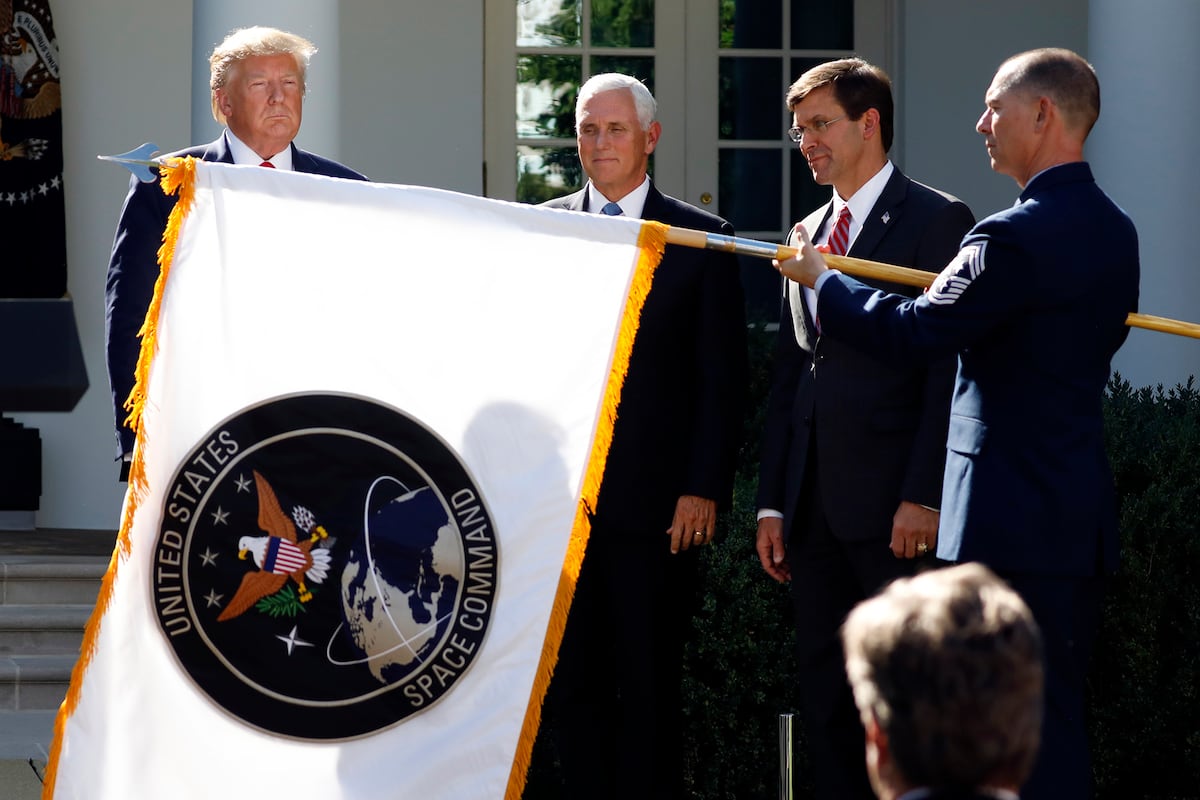A new report from the Pentagon’s inspector general highlights fundamental disagreements between the Air Force and U.S. Space Command about the risks associated with permanently basing the command’s headquarters at Redstone Arsenal in Huntsville, Alabama.
The report, dated April 11, comes amid continued tension between congressional delegations in Alabama and Colorado — where Space Command is temporarily headquartered — over where the organization should be based long term.
During an April 8 podcast hosted by Auburn University’s McCrary Institute, House Armed Services Committee Chairman Mike Rogers, R-Ala., claimed the Trump administration will formally name Redstone as Space Command’s home base later this month.
“I expect sometime during the month of April that Space Command will officially be assigned to build its headquarters in Huntsville,” Rogers said.
Meanwhile, several Colorado lawmakers are pushing for the headquarters to remain at Peterson Space Force Base in Colorado Springs, penning a letter last week to President Donald Trump arguing that the disruption caused by the relocation could hinder Space Command’s readiness. Colorado representatives Jeff Crank, Lauren Boebert, Gabe Evans and Jeff Hurd signed the letter.
“Moving the command would disrupt these established capabilities and partnerships, further diminishing our preparedness to face evolving threats,” the April 8 letter states.
The inspector general report recounts the years-long decision-making process that U.S. Space Command, the Air Force and prior administrations have taken to determine the best location for the command’s headquarters.
Space Command has been provisionally based in Colorado since its reestablishment in 2019. In 2021, just as Trump was leaving office at the end of his first term, the White House announced Huntsville as its pick for the organization’s headquarters.
The decision sparked pushback from Colorado lawmakers, largely led by former Rep. Doug Lamborn, R-Colo., who called the Air Force’s selection process “fundamentally flawed.” Lamborn requested a Government Accountability Office review of the decision and a DOD inspector general investigation. Both inquiries determined that while the basing process lacked transparency and credibility, the Air Force followed the law in choosing Alabama.
Despite the conclusion of the watchdog investigations, the White House announced in July 2023 that it had abandoned the first Trump administration’s decision and that Space Command would remain in Colorado in order to maintain “peak readiness.”
Rogers, who has led the charge in Congress for maintaining the original basing decision, immediately launched his own congressional review and called for the Pentagon’s IG to reexamine the decision-making process.
The resulting report largely rehashes the known differences between how former Space Command and Air Force leaders viewed the risks associated with moving the command — and its workforce — 1,200 miles across the country.
Then-Space Command leader Gen. James Dickinson argued relocating the organization would impair its mission readiness. At the time, the command estimated 88% of its civilian workforce would opt not to transfer to Huntsville. Further, the IG report notes, constructing even temporary operational facilities and critical networks at Redstone Arsenal would take three to four years.
“USSPACECOM leadership anticipated that the loss of civilian personnel might occur much sooner than [the Air Force] predicated and that USSPACECOM would be unable to secure the manpower investments needed to mitigate the impact of that loss on the command’s readiness,” the report states.
Meanwhile, then-Air Force Secretary Frank Kendall — whose position carries the authority to make a formal basing recommendation — supported moving the headquarters largely because of cost considerations. The service estimated the Defense Department would save $426 million by reestablishing the command’s infrastructure in Huntsville.
The report notes that while Kendall supported the Huntsville move and signed off on an environmental review, he never formally announced a final decision. That left an opening for the Biden administration’s reversal or Trump’s earlier announcement, the IG found.
Neither Kendall nor former Defense Secretary Lloyd Austin agreed to be interviewed by the inspector general for its report, which meant the office did not glean new insight into Kendall’s decision-making and Austin’s role in the process.
“Although we were not able to conduct all of the reviews we requested, we were able to draw conclusions about [Air Force] and USSPACECOM priorities that led to the announcement of the president’s decision to select Colorado Springs for the permanent location of USSPACECOM HQ,” the report states.
In a statement Monday, Rogers said the report points to “months of cover-ups and unanswered questions” about the cost of maintaining the headquarters in Colorado, calling the decision “dangerous and dishonest.”
“The Inspector General’s report confirms that the Trump Administration was correct in selecting Huntsville, [Alabama], as the site for SPACECOM Headquarters, and reveals an astounding lack of transparency and accountability by the Biden Administration,” Rogers said.
Courtney Albon is C4ISRNET’s space and emerging technology reporter. She has covered the U.S. military since 2012, with a focus on the Air Force and Space Force. She has reported on some of the Defense Department’s most significant acquisition, budget and policy challenges.
Read the full article here





